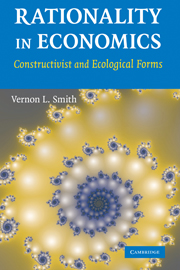Book contents
- Frontmatter
- Contents
- Preface
- Acknowledgments
- Introduction
- PART I RATIONALITY, MARKETS, AND INSTITUTIONS
- 1 Rediscovering the Scottish Philosophers
- 2 On Two Forms of Rationality
- PART II IMPERSONAL EXCHANGE: THE EXTENDED ORDER OF THE MARKET
- PART III PERSONAL EXCHANGE: THE EXTERNAL ORDER OF SOCIAL EXCHANGE
- PART IV ORDER AND RATIONALITY IN METHOD AND MIND
- References
- Index
2 - On Two Forms of Rationality
Published online by Cambridge University Press: 18 May 2010
- Frontmatter
- Contents
- Preface
- Acknowledgments
- Introduction
- PART I RATIONALITY, MARKETS, AND INSTITUTIONS
- 1 Rediscovering the Scottish Philosophers
- 2 On Two Forms of Rationality
- PART II IMPERSONAL EXCHANGE: THE EXTENDED ORDER OF THE MARKET
- PART III PERSONAL EXCHANGE: THE EXTERNAL ORDER OF SOCIAL EXCHANGE
- PART IV ORDER AND RATIONALITY IN METHOD AND MIND
- References
- Index
Summary
They're made out of meat.
Meat? …
There's no doubt about it. They're completely meat.
That's impossible. What about the radio signals? The messages to the stars?
… The signals come from machines.
Who made the machines? That's what we want to contact.
They made the machines … Meat made the machines.
That's ridiculous. How can meat make a machine? You're asking me to believe in sentient meat.
I'm not asking you, I'm telling you. These are the only sentient race in the sector and they're made out of meat …
No brain?
Oh, there's a brain all right. It's just that the brain is made out of meat.
So … what does the thinking?
You're not understanding, … the brain does the thinking. The meat.
Thinking meat!
You are asking me to believe in thinking meat!
Yes, thinking meat! Conscious meat! Loving meat. Dreaming meat! The meat is the whole deal.
Bisson (1995)Humans are built to see what they are expecting to see, and it's hard to expect to see something you've never seen.
Grandin and Johnson (2005, p. 51)Introduction
The organizing principle throughout this work is the simultaneous existence of the two rational orders: constructivist and ecological. These two orders interact daily in ordinary human interaction, but that interaction is almost entirely invisible to our conscious experience. Theory is intensively constructivist. What enables theory to do useful work (work is “accomplishment”) is through testing processes in the laboratory, observations in the field, or both.
- Type
- Chapter
- Information
- Rationality in EconomicsConstructivist and Ecological Forms, pp. 24 - 42Publisher: Cambridge University PressPrint publication year: 2007



